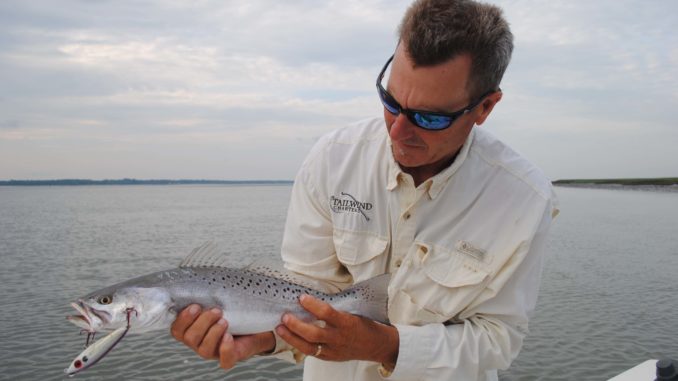
A topwater bait isn’t the easiest thing for a trout to hit, so it’s not unusual to have a speck hit a big topwater plug and knock it completely up in the air — but not get hooked.
A “swing and a miss” presents fishermen with an unusual opportunity that Jeff Yates and Danny Rourk recognize.
“You get a lot of ‘short strikes,’” Yates said. “When they miss a Zara Spook, a lot of people will just let it sit, and that’s the biggest mistake you can make.
“You need to keep it moving. The trout has missed the bait, and you’ve got to make it look like it’s escaping, like it’s panicking. When he misses it, you’ve got to keep it moving for at least two or three feet. That will work really well.”
Rourk likes to get his bait back to the boat and make another cast as quickly as possible when he gets a short strike on a topwater bait.
“If a fish blows up on your topwater bait and misses it, nine times out of 10, if you can throw it right back in the same spot and retrieve it the same way, that same fish will hit it again.”
Trout are particularly apt to come back at a bait a second time, Yates said, because they usually strike from below and to the side of a bait. Unlike more mobile fish, when a trout strikes at a bait and misses on the rise, it usually noses over and heads back toward the bottom. When the fish gets turned around, it’s looking up at the surface, hoping to see a wounded baitfish sinking or struggling at the surface.
It’s a common practice among freshwater fishermen to have a “follow-up” bait tied on a second rod that’s within easy reach. That way, the angler can grab the second rod and cast directly to the spot where the strike was missed. The key is, a bait that will sink slowly, down into the trout’s field of vision, is required. Heavier soft-plastics such as Senkos are perfect because they can be cast long distances, and they’ll sink when they hit the water.
Editor’s note: This article is part of the Tips for Topwater feature in the November issue of South Carolina Sportsman. Digital editions can be downloaded right to your computer or smartphone.




Be the first to comment